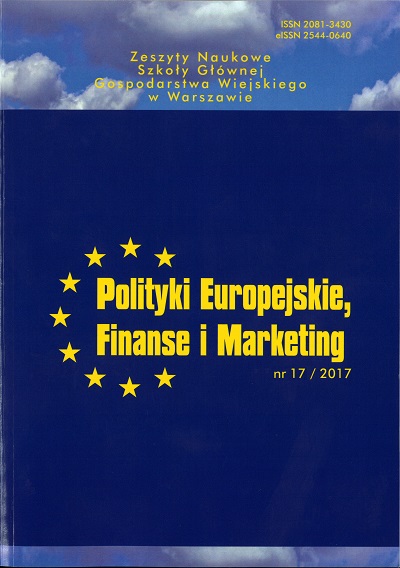Main Article Content
Article Details
Becker Ch.: The human actor in ecological economics: Philosophical approach and research perspectives, Ecological Economics 60/2006. (Crossref)
Becker Ch.: Sustainability Ethics, 2010, http://ssrn.com/abstract=1626013 [accessed: 1.03.2016]. (Crossref)
Bina O., Guedes Vaz S.: Humans, environment and economies: From vicious relationships to virtuous responsibility, Ecological Economics 72/2011. (Crossref)
Chatzidakis A., Hibbert S., Smith A. P.: Why people don't take their concerns about fair trade to the supermarket: The role of neutralization, Journal of Business Ethics 74/2007. (Crossref)
Daly H.E., Farley J.: Ecological Economics. Principles and Applications, ISLAND PRESS, Washington DC 2004.
Esterlin R. A.: Will Raising the Incomes of all Increase the Happiness of All? Journal of Economic Behavior and Organization 27/1995. (Crossref)
Faber M., Petersen T., Schiller J.: Homo oeconomicus and homo politicus in Ecological.Economics, Ecological Economics 40/2002. (Crossref)
Ferraro E., Reid L.: On sustainability and materiality. Homo faber, a new approach, Ecological Economics 96/2013. (Crossref)
Frankish K., Evans J.: The duality of mind: An historical perspective, [In:] In two minds: Dual processes and beyond, Ed. J. Evans, K. Frankish, OXFORD UNIVERSITY PRESS, New York, 2009. (Crossref)
Frederick S., Kahneman D.: Representativeness revisited: Attribute substitution in intuitive judgment, [In:] Heuristics of Intuitive Judgment: Extensions and Applications, Ed. T. Gilovich, D. Griffin, D. Kahneman, CAMBRIDGE UNIVERSITY PRESS, New York 2002. (Crossref)
Gendron C.: Beyond Environmental and Ecological Economics: Proposal for an Economic Sociology of the Environment, Ecological Economics 105/2014. (Crossref)
Gintis H.: Beyond Homo Economicus: evidence from experimental economics, Ecological Economics 35/2000. (Crossref)
Jager W., Janssen M.A., De Vries H.J.M., De Greef J., Vlek C.A.J.: Behaviour in commons dilemmas: Homo economicus and Homo psychologicus in an ecological-economic model, Ecological Economics 35/2000. (Crossref)
Jones E.: Rationalisation in every-day life, The Journal of Abnormal Psychology vol. 3 no. 3/1908. (Crossref)
Kirman A.: Is it rational to have rational expectations? Mind & Society 13/2014. (Crossref)
Kraciuk J.: Paradygmat homo oeconomicus w aspekcie rozwoju ekonomii heterodoksyjnej, Prace Naukowe Uniwersytetu Ekonomicznego We Wrocławiu. Ekonomia 401/2015. (Crossref)
Meadows D. H., Meadows D. L., Randers J., Behrens W.: The Limits to Growth, UNIVERSE BOOKS, New York 1972.
Menzel S.: Are emotions to blame? - The impact of non-analytical information processing on decisionmaking and implications for fostering sustainability, Ecological Economics 96/2013. (Crossref)
Munda G.: Environmental Economics, Ecological Economics, and the Concept of Sustainable Development, Environmental Values 6/1997. (Crossref)
Muth J. F.: Rational Expectations and the Theory of Price Movements, Econometrica, vol. 29 no. 3/1961. (Crossref)
Nyborg K.: Homo economicus and homo politicus: interpretation and aggregation of environmental values, Journal of Economic Behavior & Organization 42/2000. (Crossref)
Røpke I.: The early history of modern ecological economics, Ecological Economics 50/2004. (Crossref)
Røpke I.: Trends in the Development of Ecological Economics from the Late 1980s to the Early 2000s, Ecological Economics 55/2005. (Crossref)
Schiliro D.: Bounded rationality: Psychology, economics and the financial crises, Theoretical and Practical Research in Economic Fields vol. IV issue 1(7)/2013.
Siebenhüner B.: Homo sustinens - toward a new conception of humans for the science of sustainability, Ecological Economics 32/2000.
Simon H. A.: Theories of bounded rationality, [In:] Decision and Organization, Ed. C. B. McGuire, R. Radner, NORTH HOLLAND PUBLISHING COMPANY 1972.
Smith A.: The Theory of Moral Sentiments, DOVER PUBLICATIONS, INC Mineola, New York 2012,
https://books.google.pl/books?id=2iV_vnHmdUEC&printsec=frontcover&hl=pl#v=onepage&q&f [accssesed: 24.02.2017].
Smith V. L.: Constructivist and Ecological rationality in Economics, The American Economic Review vol. 93 no. 3/2003. (Crossref)
Söderbaum P.: Values, ideology and politics in ecological economics, Ecological Economics 28/1999. (Crossref)
Spash C. L.: Social Ecological Economics: Understanding the Past to See the Future, American Journal of Economics and Sociology vol. 70 no. 2/2011. (Crossref)
Stanovich K. E.: Who is rational? Studies of Individual Differences in Reasoning, PSYCHOLOGY PRESS, ROUTLEGE, TAYLOR&FRANCIS GROUP, New York, London 2011.
Waring T.M.: New Evolutionary Foundations: Theoretical Requirements for a Science of Sustainability, Ecological Economics 69/2010. (Crossref)
Downloads
- Marzanna Witek-Hajduk, Jolanta Mazur, Andrzej Sznajder, Bartosz Targański, Piotr Zaborek, Cechy domen internetowych polskich marek eksportowych a specyfika branży , Zeszyty Naukowe SGGW, Polityki Europejskie, Finanse i Marketing: Nr 17(66) (2017)
Możesz również Rozpocznij zaawansowane wyszukiwanie podobieństw dla tego artykułu.
- Jolanta Zrałek, Motywy zachowań proekologicznych w kontekście zmieniającego się poziomu świadomości ekologicznej Polaków , Zeszyty Naukowe SGGW, Polityki Europejskie, Finanse i Marketing: Nr 9(58) (2013)
- Aleksandra Burgiel, Izabela Sowa, Jolanta Zrałek, VOLUNTARY SIMPLICITY – SUSTAINABLE ALTERNATIVE TO OVERCONSUMPTION , Zeszyty Naukowe SGGW, Polityki Europejskie, Finanse i Marketing: Nr 13(62) (2015)

Utwór dostępny jest na licencji Creative Commons Uznanie autorstwa – Użycie niekomercyjne 4.0 Międzynarodowe.





